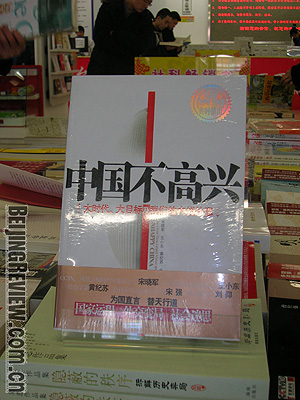| The popularity of Unhappy China: The Great Time, Grand Vision and Our Challenges, released on March 12, has far surpassed the expectations of its promotion company Kong Hong (Beijing) Book Co. Ltd.
|

|
|
HOT SELLER: The widely popular Unhappy China sits on a conspicuous shelf opposite the entrance of a downtown Beijing bookstore for special promotion (LI LI) |
Li Ying from the company's promotion department told Beijing Review that 440,000 copies had been printed by the night of April 2, with demand so high that some complimentary books given to company staff had to be recalled to fill orders. Over the two weeks shortly after its release, the book occupied the top spot on all categories of the weekly bestseller lists of Dangdang.com, one of China's largest online bookstores.
Unhappy China, a collection of essays from five scholars that harshly criticizes Chinese intellectuals' lack of confidence in their country, suggests the country should pursue more stern foreign policies against a Western world that has always been hostile to it.
The book argues that with "Chinese national strength growing at an unprecedented rate, China should stop debasing itself,
recognize the fact that it has the power to lead the world and break away from Western influence."
"We should clearly understand that Western countries have been consistent and cooperative in containing China," writes one author on last December's meeting between French President Nicolas Sarkozy and the Dalai Lama. Wang Xiaodong, this chapter's writer, goes on to warn the Chinese that they should have a clear mind on "how people in the West bully the Chinese with their technical advantages" and that "China is very isolated in the world."
In another chapter titled "The United States Is Not a Paper Tiger, Rather It Is an Old Cucumber With Green Paint," co-author Song Xiaojun writes, "[Compared to the 1960s,] China now is too soft in diplomacy and lacks the spirit of newborn calves that are not afraid of tigers."
"Our book is meant to make people uncomfortable with the status quo and think about changes," co-author Song Qiang said during his interview with the International Herald Leader. "Our role is like a flea and we want the U.S. Government to know about our existence."
However, Song said Chinese nationalists are rather open to criticism from the West. "We also criticize Chinese society and we can accept sincere criticism from the West," he told the International Herald Leader.
Unhappy China has been widely regarded as a follow-up to the 1996 bestseller China Can Say No, which, many believe, signaled the awakening of nationalism among some Chinese intellectuals. Both books are written by experienced journalists, editors and TV commentators.
Mixed response
The book's supporters and critics, ranging from renowned writers to ordinary readers, have been debating fiercely in newspapers and on TV and the Internet. A Google search found 197,000 entries on Unhappy China among all Chinese-language websites.
An online survey at Chinese portal Sina.com found people almost equally divided on whether "China has the power to lead the world," the thesis put forward in the book. Among 5,381 respondents, 54.4 percent agreed "China should seize the best opportunity created by the financial crisis and stand out as a leader," while 41.3 percent believed that "this radical nationalism must be brought under control, and we should adopt more rational and realistic thinking."
At Douban.com, a popular online community for book, movie and music reviews, the book has been reviewed by people who either love it or hate it. By April 6, some 750 people had rated it. Of those, 536 gave it one out of five stars, the lowest rating available on the scale.
Xu Bingwen, a 30-year-old civil servant in Shanghai who reviewed the book on Douban.com, accused it of "a scramble of random thoughts... It tries to sell to us that China is pretty good now. We shouldn't be self-critical. We shouldn't be caught up in domestic problems. Nothing else," writes Xu.
Xu told Beijing Review that he does not believe in the rise of a new round of nationalism among Chinese youth, as was deduced by the Western media after the release of this book. "Mounting pressure from life and fierce competition in the labor market are not enough to spur a round of nationalism. I personally believe that 'rising nationalism' is only an illusion on the Internet," Xu said.
Shang Rong, a 20-year-old university photography student, gave the book a five-star rating on Douban.com. He told Beijing Review that although he dislikes the authors' paranoid tone and doubts the validity of their arguments, he believes such voices are necessary in any society.
| 